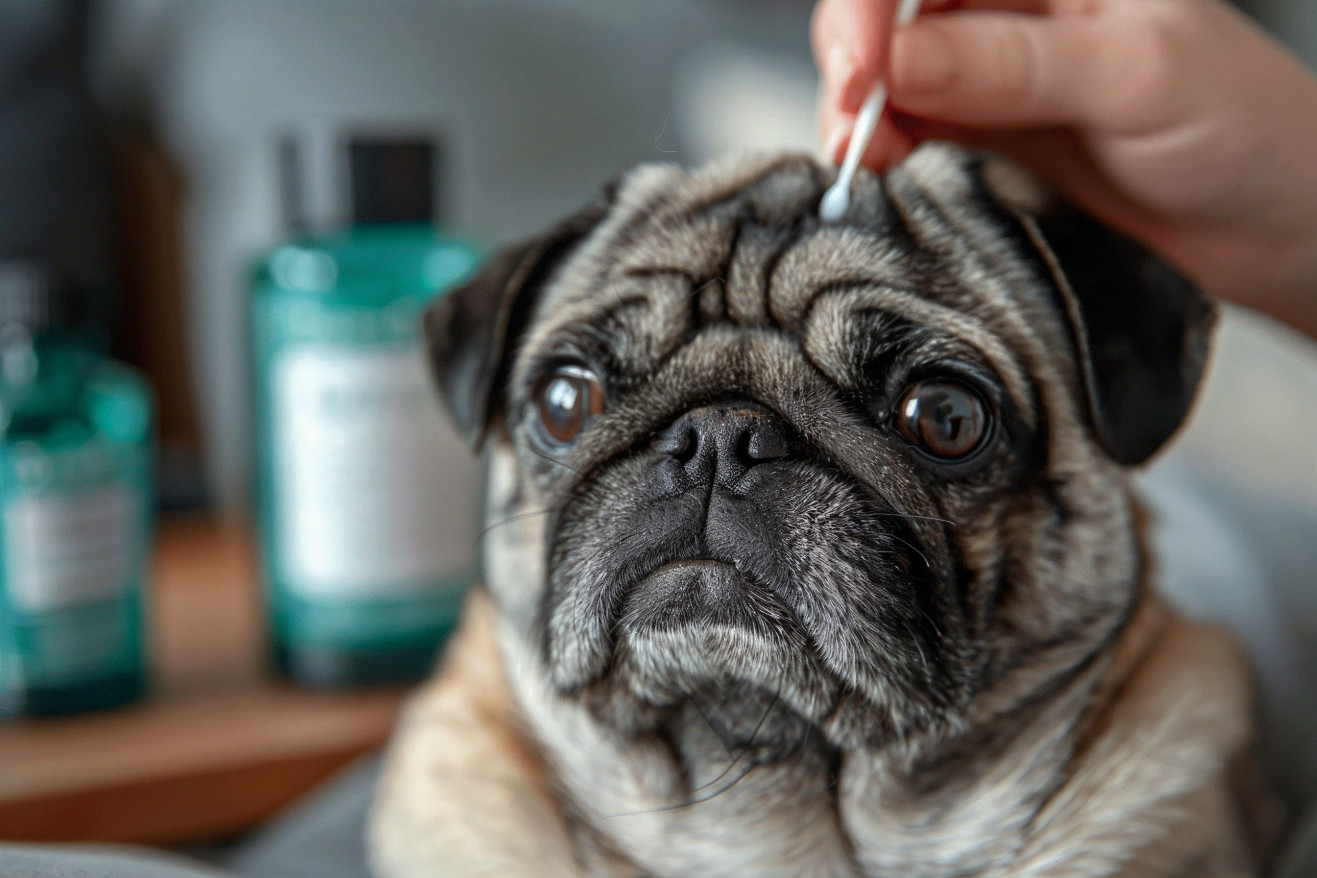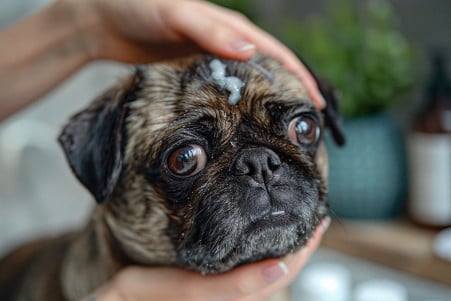Can You Put Bactine on Dogs? What the Science Says
10 June 2024 • Updated 8 June 2024

If your dog has a minor injury, you may wonder if you can use Bactine to help them heal. While Bactine is safe for dogs as long as it's used correctly, it does contain some ingredients, such as benzalkonium chloride, that can be harmful if they're used too liberally or if they come into contact with certain parts of the body, like the eyes. As a result, you should always talk to your vet before using a new product and try to use pet-safe antiseptics whenever you can.
That said, while Bactine isn't safe for dogs if it's used inappropriately, this article will take a deep dive into the research and expert opinions on its safety and how it should be used. We'll cover the research on its active ingredients, share insights from vets, and wrap up with some clear guidelines so you can decide whether or not to use Bactine or another pet-friendly antiseptic on your dog.
Is Bactine safe for dogs?
Active Ingredients in Bactine: What They Do to Dogs
Bactine is made up of two main active ingredients - lidocaine and benzalkonium chloride. Lidocaine is a local anesthetic that helps to numb the skin and temporarily relieve pain. However, as WebMD points out, high levels of lidocaine that are absorbed through the skin can be toxic and even fatal to dogs.
The other active ingredient, benzalkonium chloride, is an antiseptic that helps to prevent the growth of bacteria and infections in minor cuts and scrapes. However, it can also cause skin irritation, stinging, and redness, especially in sensitive areas or open wounds, according to The Healthy Dog Co.
So, while Bactine's ingredients can help with minor cuts and scrapes, they can also be toxic and irritating if they are used too much or in the wrong way on our furry friends. Ingesting lidocaine can cause vomiting, seizures, and even a coma in dogs. Because of this, it's important to use human products like Bactine with caution and under the guidance of a vet. However, if used carefully, Bactine may be helpful for some minor skin issues and wounds in dogs.
When to Go to the Vet for Your Dog's Skin Condition
Although Bactine can help with minor cuts and scrapes, it's important to know when your dog's skin condition is serious enough to need professional help. WebMD explains, if you're dealing with ongoing or worsening skin problems, like rashes, ear infections, skin sores, or allergic reactions, your dog may have an underlying issue that needs to be addressed by a vet.
More serious skin problems, such as generalized pyoderma (deep skin infections), systemic signs of illness, or suspected methicillin-resistant infections, need to be treated and diagnosed by a vet, according to Today's Veterinary Practice. If your dog is scratching a lot, losing hair, or showing other signs of skin discomfort, Zoetis Petcare says you should have a vet look at the problem and provide a diagnosis and treatment plan.
Getting medical care as soon as possible can help make sure your dog's skin problem doesn't get worse and that they get the care they need for their specific issue, explains The Vets. By knowing when to look for professional help, pet parents can feel more confident in when they're using Bactine and when they're seeking medical care.
Natural and Pet-Safe Bactine Alternatives for Dogs
Although Bactine is safe for use on minor wounds, there are many natural and pet-safe alternatives that may be better for dogs. Dogster notes that herbal remedies like arnica, green tea, coconut oil, and aloe vera can be used to help heal and calm minor skin irritations and wounds without the risk of side effects.
There are also over-the-counter pet-specific products, such as antimicrobial sprays, ointments, and creams, that can be used to treat wounds and prevent infections. iHeartDogs explains that products that include manuka honey, silver sulfadiazine, or CBD can provide antimicrobial and anti-inflammatory benefits without the side effects of traditional antiseptics.
That said, it's always best to talk to a veterinarian before trying a new product on your dog, as some natural remedies or ingredients may not be appropriate for certain conditions or individual pets. That said, by looking into these pet-safe options, you can find effective ways to treat your dog's minor wounds without the potential risks of using a product like Bactine.
OTC Topical Medications for Dogs: The Good and the Bad
There are many over-the-counter (OTC) topical medications available for dogs, but it's important to know the good and the bad. VCA Animal Hospitals explains that OTC antihistamines like Benadryl can be used to treat allergies in dogs, but they can also cause drowsiness or hyperactivity.
Topical antibiotic ointments, like Neosporin, can be used to treat minor cuts and scrapes, but Trupanion cautions that they can also cause allergic reactions and even slow down the healing process in some dogs. Steroid creams and ointments can be used to treat itching and inflammation, but DVM360 warns that they should be used sparingly and under the supervision of a veterinarian to avoid potential side effects.
It's important to make sure to read the labels, use the medications as directed, and check with a vet before using any OTC topical medication on your dog, as many human medications can be toxic to dogs. By learning more about the good and the bad of these popular medications, dog owners can make sure they're making the best choices for their dog's skin health.
How to Use Bactine on Dogs and Safety Precautions
If you decide to use Bactine on your dog, make sure to use it as directed and with caution. Doggie Herbs notes that you should not apply Bactine to sensitive areas like the eyes, ears, or open wounds because the ingredients can cause irritation and stinging.
Make sure to watch your dog closely after applying Bactine and take them to the vet if they experience any side effects, including but not limited to excessive licking, vomiting, or difficulty breathing, as WebMD points out. Do not let your dog consume Bactine, as it can be toxic and even deadly in large doses.
Doggie Herbs also recommends that you only use Bactine on minor cuts and scrapes and that you talk to your vet about other skin issues that are more severe or won't go away. If you do this, you can make sure that you're using this popular antiseptic safely on your furry friend.
Conclusion: How to Make the Best Choices for Your Dog's Skin Health
While Bactine can be helpful for treating minor cuts and scrapes in dogs, it's also important to know the risks and limitations of the product. It's always best to talk to a vet before using a new product on your dog, as they can help you find the best and safest treatment options.
There are a number of natural and pet-safe alternatives to Bactine that may be better for some dogs or skin issues, including herbal remedies, antimicrobial sprays, and manuka honey-based products. Knowing when a skin issue is serious enough to require a vet's care is important to make sure that your dog doesn't experience any complications and gets the care they need.
By being a well-informed and responsible pet owner, you can make sure that you're making the best choices for your dog's skin health and overall health.


